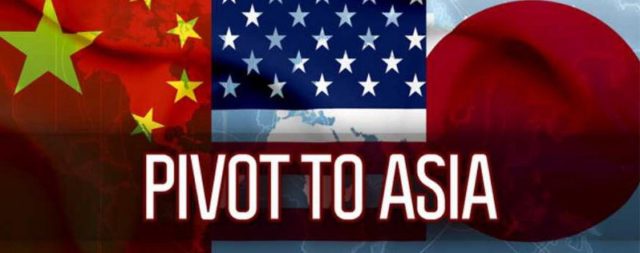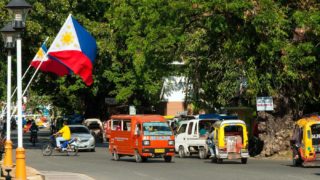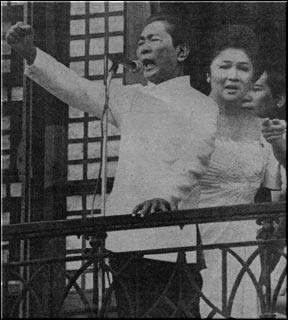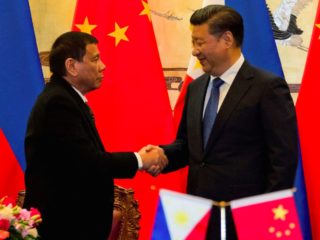BUNGLING DUTERTE DESTROYED THE DEFENSE STATUS OF THE SPRATLEYS
____________

The Philippines elected another cruel bungler, whose politics and moral aptitude compliment each other. This is what happen when you elect a criminal goon in power, with his knowledge to govern limited to the use of extra judicial killings. People of the Philippines wake up. If the people of South Korea can impeach their president just for preferential treatment of a friend, more so with you. Are you a nation of 100 million cowards, allowing this cruel tyrant to continue the murder of your sons and daughters, allowing a change in your democratic ideals to being a communist.
For the now geo political scene, we see first the Golan Heights, now the South China Sea – The United States used to patrol this regularly to ensure “freedom of navigation” for all the nations who claim part (or all) of the sea and the islands within it. Now it is being reported that it has called its aircraft carriers home and left the competing states to sort it out for themselves: hoping, of course, that they won’t.
For the now geo political scene, we see first the Golan Heights, now the South China Sea – The United States used to patrol this regularly to ensure “freedom of navigation” for all the nations who claim part (or all) of the sea and the islands within it. Now it is being reported that it has called its aircraft carriers home and left the competing states to sort it out for themselves: hoping, of course, that they won’t.
The US has seen what happens to its own country when it gets involved in battles and conflicts it can’t win for the sake of “principle” – removing dictators, protecting democracy by removing democratically-elected leaders it doesn’t like, etcetera. Like other countries, it long assumed that if the domestic audience agreed with the principle it would eventually be able to conjure up enough resources, human and material, to win the day, as happened in traditional wars for “God and the Right Cause” as it was often expressed.
It has now discovered however that when it does not really have the principles it claims it has, it can only work in partnership with allies who know this themselves, and are reluctant to go too far to support it. This is why Donald Trump is complaining about other countries not footing their share of the bill for NATO operations – there is a big difference between helping a major ally because it asks you to and paying for the operation yourself, when you know it is not about what the ally says it is about.
Now the US wants other countries, all of whom claim parts of the South China Sea which are also claimed by somebody else, to have the same problem. It would be very difficult for countries which have long pursued claims to the area to tell their own voters that this doesn’t matter anymore, when each is making a claim against openly hostile or barely reliable neighbours.
For a while at least, those countries won’t have the US Navy sailing to their rescue to ensure “neutrality” if they feel their rights are being violated. They will have to put their own resources where their mouths are, and get involved in costly imbroglios which will only harden the principles of any defeated or disadvantaged party.
Consequently the US withdrawal of its ships can be seen as a “passive-aggressive” move – creating potential conflict by no longer being around to stop it. This confirms America’s view of its importance. But it is also a directly aggressive move aimed at two particular targets – and is yet another example of the US trying to convince an increasingly skeptical world that one “evil” necessarily leads to another, despite the fact the US itself actually put it there.
Our friends in the south

Philippines flag – the three yellow stars stand for the primary island groups in the country – the Mindanao, Visayas and Luzon – and the sun stands for freedom, unity and autonomy. The red stripe stands for courage and the blue stripe stands for justice, peace and truth.
If you look at the map you wonder why the US is regarded as the guarantor of peace in a place so far away. However that group of big islands to the east of the South China Sea give us a clue.
Puerto Rico is often described as the 51st State of the USA. Those who do not like US influence in their countries say the same about where they come from.
But the real 51st State is the Philippines, about as far away from the mainland US as you can get, and the sorted history – even Mark Twain touch upon it in War Prayer. If you ever wondered why the term “Latino” is used for people considered acceptable and the term “Hispanic” is reserved for the disreputable, the answer is found right here.
The US was given control of the Philippines in 1898 following its victory in the Spanish-American War. It had previously been a Spanish colony, but was fighting for its independence and continued to do so after the US takeover, and then from the US. Having lost that conflict it lived under various forms of US-sponsored government until 1946, when it emerged as a fully independent nation with unquestioning obedience, at official level, to the colonial power which had beaten its people in war two generations earlier, and slaughtered them in mass.
All this will sound familiar to a contemporary readership. The same thing is happening in Iraq; then it happened in Afghanistan, and again it happened in Sudan. First send in the troops to destroy the country, then gradually let it govern itself when it has become US allied and US dependent and you are sure of its loyalty. Exactly what the Soviet Union was always vilified for doing in Eastern Europe, though we now know how much support the US gave to that process.
In this respect, the Philippines created a blueprint for what the US now does in other countries, following on from what the white European settlers in the American colonies had done to the native Americans. In another respect too it set a familiar pattern. The quality of the post-US conquest Philippine governments often left much to be desired, and an effective, locally-controlled democracy would have ensured that they were removed long before they actually were.
Successive presidents were elected on a promise to combat corruption, which demonstrates that none of them was that interested in actually doing this.
But they banned the Communist Party, having helped create its southern insurgency by collaborating with the Japanese occupation during World War II and the US conquerors before and after, and took measures against Chinese traders after the Maoist takeover there, despite Chinese resident help in ending the Japanese occupation.
As ever, and as long as the country remained US allied and US dependent, the welfare of the local population was not a factor in US decision making. Ferdinand Marcos declared martial law in 1972 and ruled as one of his era’s most notorious and corrupt dictatorships, which was also considered acceptable by the so-called democratic West.
It is known that in his last weeks in power before a genuine popular revolution (one of the few) overthrew him, Marcos was frantically phoning US Senators such as Paul Laxalt, described as President Reagan’s best friend in Congress, who were trying to persuade their boss to keep him in power, only for Reagan himself to order Marcos to get out while he still could.
By allowing the People Power Revolution in 1986, the US established links with ordinary Filipinos which its previous actions had failed to do. Though there was widespread acceptance of US influence before then, this is not the same as a partnership with the population.
Consequently Philippines governments of the past 30 years have strengthened the alliance with the US, whilst at the same time being active players in regional organisations such as ASEAN. Who benefits from this arrangement can be seen by asking: how many articles about ASEAN influence on the US have you read?
Learning the hard way
But now that has changed. The current President of the Philippines is Rodrigo Duterte, who espouses the same new strain of popular nationalism seen in South American countries, such as Ecuador.
These leaders are not trying to kick the US out of their countries, but to take more control of their own affairs, to exert more influence in the world and to redistribute wealth and power. In Duterte’s case, this means reorienting foreign policy towards regional countries, such as China, rather than being the 51st State surrounded by neighbours who don’t like that.
The US has always patrolled the South China Sea to ensure that there is “freedom of navigation” on its own terms. Those terms are: The Philippines remains in line, the Chinese and Vietnamese know their place and the other claimants to the Sea, such as Taiwan, remain dependent on the US for the furtherance of any claims.
If everyone accepts those terms, there is freedom of navigation and action. If one or two countries don’t, the terms will be enforced by a few more warships, using the Philippines as a base.
The Philippines has always made its own claims to part of the South China Sea. But while other countries base theirs on alleged historic ownership, The Philippines largely bases its on the fact that the disputed areas are close to it. If Germany claimed German-speaking Austria because it was close to it, we all know what the reaction would be, and we have been there before.
But the Philippines persists with these claims to muddy those waters, another standard US strategy, the one used in Iran in the 1950s to restore the Shah and in domestic cases involving people who have crossed the US government.
Last year, a tribunal in The Hague ruled on one of these claims. It declared that the Philippines did indeed have sovereignty of what it calls the West Philippine Sea, and that there was no basis for China’s claim to historic sovereignty over that area of the sea and the islands within it. China boycotted these proceedings and has refused to recognise this outcome. It has continued establishing military outposts on artificial islands within this area, which is what prompted the latest US show of force in the region.
But this action has now been undermined by Duterte himself. Following discussions with the Japanese Prime Minister, he has declared, as part of his new policy that the area awarded to his country has never belonged to anyone. He has not so much looked a gift horse in the mouth as sent it to the glue factory, and according to some, he is sending his country with it.
Now Commander-in-Chief Trump has ordered the US ships out of the South China Sea. Of course he has. The US has always insisted it is neutral in the South China Sea conflict of claims because it is happy for the area to be another Golan Heights, a place which will always create conflict that can be blamed in the locals and weaken them.
Duterte’s latest actions will defuse immediate conflict, and lessen the need for other countries to turn to the US for help. It has also opened up the possibility of a long-term solution arrived at regionally, by the countries concerned, without US involvement or approval.
“Right,” the US is saying to Duterte: “Whatever you want to do, all your neighbours have claims to the sea, and those claims are part of their national identities. Their domestic audiences won’t stand for them giving up those claims. So we will magnify all claims in the Western media, tell them how dangerous you are, and when your neighbours pursue their claims because we aren’t there you will have no choice but to do the same and sort it out for yourself.
You will only achieve peace by returning to the status quo of perpetual conflict kept in check by us. Then we will see if you still want to cosy up to the Chinese and Russians, after all we have done to make you into the 51st State in all but name and legal rights”.
Hang it on Russia… again
If further conflict does break out in the South China Sea by encouraging other countries to pursue their claims, someone will be blamed for this. It is a common exercise in Western schools to ask history students who was to blame for the First World War.
No one can ever agree on a particular culprit, and that is the case with most conflicts before they start, whatever might be said or done afterwards.
But it is clear who will have to shoulder the blame for anything that happens in the South China Sea. It will not be Duterte himself, or China, or other claimants such as Vietnam, as laying blame on any of these parties would only magnify calls for the US to sort it out, by show of force or internal regime change. It will, once again, be Russia which is held responsible, as anything can be pinned on the Russians causing such damaging relations with other states.
If the Chinese are doing something, it must be because they are in league with the Russians economically and in the Shanghai Cooperation Organisation, which is seen as a rival to NATO.
If the Vietnamese are trying to pursue their claims it is because they are still caught up in the Maoist versus Soviet ideological disputes of old, or so we are led to believe by the lack of press interest in Vietnam since the Communist takeover in 1975.
If Taiwan wants to extend its own claims this is to protect it from the Russians, if Malaysia wants to claim bits, this is because it isn’t enough like Singapore, due to Russian influence and ideas.
This is another pattern we have seen quite a lot recently. If Poland and Hungary have increasingly nasty, anti-immigrant governments which contradict EU principles and cause problems for that organisation, we are supposed to think that the Russians are responsible because these former Eastern Bloc states are merely reacting to their past.
If ISIL declares another caliphate in what used to be Soviet Central Asia, then the Russians did it, because its Muslim population are all terrorists.
If countries east of Trieste don’t get gas because Ukraine hasn’t paid its bill, the Russians are responsible – even though it is Russia which is owed the money.
If Duterte tries to improve relations with Russia, despite this now being official US policy, the Russians are again responsible for any conflict which results. The resolution of any conflict will also be seen as a victory over Russian influence. If no conflict breaks out, this will be because the Russians are being kept at bay, thus demonstrating US hegemony.
It must be nice to live in a world of constantly self-fulfilling arguments; indeed politics attracts people who can only live that way. But the real world is more complicated, and no one’s problems are addressed by pretending otherwise.
The US may still go back to the South China Sea if it wants to be seen to be stopping China, and by extension the Russian Federation. But this will not be to restore the existing status quo, but to prepare the ground for leaving regional countries, principally the Philippines, to suffer the consequences of not wanting to do this.
Everyone has to be convinced that keeping flashpoints the US can take advantage of as a threat is still a good thing. A major conflagration far from the US is hardly going to be seen as a “big price” to pay for doing this, after what we have seen in the Middle East and Yugoslavia, among others.




No comments:
Post a Comment